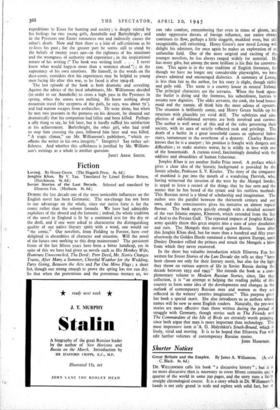Fiction
Loving. By Henry Green. (The Hogarth Press. 8s. 6d.) Jenghiz Khan. By V. Yan. Translated by Lionel Erskine Britton. (Hutchinson. 9s. 6d.) Soviet Stories of the Last Decade. Selected and translated by Elisaveta Fen. (Methuen. 8s. 6d.)
DURING the last decade one of the most noticeable influences on the English novel has been Germanic. The sea-change has not been to our advantage on the whole, since our native forte is for the comic rather than the solemn formula. We have had admirable exploiters of the absurd and the fantastic ; indeed, the whole tradition of the novel in England is lit by a continued zest for the dry or the droll, and if one were asked to characterise the distinguishing quality of our native literary spirit with a word, one would say " the comic." Our novelists, from Fielding to Forster, have ever delighted in absurdities of character and situation. Will the novel of the future owe nothing to this deep mainstream? The persistent frosts of the last fifteen years have been a bitter handicap, yet in spite of this we have had given us novels such as His Monkey Wife, Humours Unreconciled, The Devil: Poor Devil, Mr. Norris Changes Trains, After Many a Summer, Cheerful Weather for the Wedding, Party Going, Between the Acts and Put Out More Flags ; a short list, though one strong enough to prove the spring has not run dry. So that when the pretentious and the portentous menace us, we
can take comfort, remembering that even in times of gloom, 'and under oppressive threats of foreign influence, our native stream
continues its flow, perhaps a little sluggish, muddied even, but still recognizable, still refreshing. Henry Green's new novel Loving will delight his admirers, for once again he makes an exploration of an
unfamiliar field. One of the most original and exciting of the younger novelists, he has always ranged widely for material. He has many gifts, but among the most brilliant is his flair for conversa-
tion. This again is in the true tradition of English literature, for
though we have no longer any considerable playwrights, we have always admired and encouraged dialectics. A summary of Loving
is less than fair to, the author, for his story is slight, though richly and gaily told. The scene is a country house in neutral Ireland. The principal characters are the servants. When the book opens the butler is dying and the footman, his subordinate, hurries to assume new dignities. The older servants, the cook, the head house- maid and the nannie, all think him the most odious of upstarts. The situation is brilliantly comic, and Henry Green builds up his structure with plausible yet vivid skill. The subtleties and sim- plicities of old-fashioned servants are both involved and curious. The author is well aware of this and of the rules governing their society, with its aura of strictly reflected rank and privilege. The death of a butler in a great household causes an upheaval below stairs, tantamount to the overthrow of a dynasty. Charley Raunce knows that he is a usurper ; his position is fraught with dangers and difficulties ; to make matters worse, he is wildly in love with one of the housemaids. A curious novel, fascinatingly detailed with the oddities and absurdities of human behaviour.
Jenghiz Khan is yet another Stalin Prize novel. A preface which gives a clear idea of the historic background is provided by the Soviet scholar, Professor S. V. Kiselev. The story of the conqueror of mankind is put into the mouth of a wandering Dervish, who, having witnessed the invasion of the west by the Mongol hordes, is urged to leave a record of the things that he has seen and the stories that he has heard of the tyrant and his ruthless methods. This Russian novel is a blend of scholarship and imagination. The author sees the parallel between the thirteenth century and our own, and this consciousness gives his narrative an almost topical flavour. The book opens quietly enough with a detailed account of the vast Islamic empire, Khoresm, which extended from the Sea of Aral to the Persian Gulf. The repeated impacts of Jenghiz Khan's army quickly thiew this great empire into a state of utter desolation and ruin. The Mongols then moved against Russia. Soon after this Jenghiz Khan died, but for more than a hundred and fifty years afterwards the Golden Horde remained a threat against Europe, until Dmitry Donskoi rallied the princes and struck the Mongols a blow from which they never recovered.
In the short but valuable introduction which Elisaveta Fen has written for Soviet Stories of the Last Decade she tells us they "have been chosen not only for their literary merit, but also for the light they throw on various aspects of life in Soviet Russia during the decade between 1933 and 1943." She intends the book as a com- plementary volume to Modern Russian Stories, since, like that collection, it is " an attempt at helping the reading public of this country to form some idea of the developments and changes in the outlook of contemporary Russian men and women as they are reflected in the writers' creative imagination." This purpose gives her book a special merit. She also introduces us to authors whose names will be new to most English readers. Naturally, the pre-war stories are more effective than those written during the period of struggle with Germany, though stories such as The Friends and The Commandant of the Isle of Birds are certainly worth printing, since both argue that man is more important than technology. The most impressive item is -A. G. Malyshkin's South-Bound, which is lively, vivid and moving. It is to be hoped that Elisaveta Fen will edit further volumes of contemporary Russian stories.
JOHN HAMPSON.


























 Previous page
Previous page